The Third US-China Smart Education Conference Held in Beijing with a Focus on Artificial Intelligence 2.0 and ICT in Education 2.0
date:2018-03-29 15:09author:小编source:Smart Learning Instituteviews:
The Third US-China Smart Education Conference convened at the Beijing International Conference Center on March 18th. This year’s conference was hosted jointly by Beijing Normal University, University of North Texas and National Engineering Laboratory for Cyberlearning Intelligent Technology, and sponsored by the Smart Learning Institute of Beijing Normal University, China Research Institute of Education and Social Development and the Association for Educational Communications and Technology (AECT). In attendance were Pan Yunhe and Zhao Qinping, academicians of the Chinese Academy of Engineering, Lei Chaozi, director of the Science and Technology Division of the Ministry of Education, Dong Qi, President of Beijing Normal University, Zhong Binglin, Chairman of the Chinese Society of Education, Eugene G. Kowch, President of AECT and experts from the science and technology communities of China and the US. They engaged in in-depth discussions on the frontier issues related to Artificial Intelligence (AI) 2.0 and ICT in Education 2.0. The conference was moderated by Zhou Zuoyu, vice president of Beijing Normal University. A total of over 800 participants from research institutes, universities and businesses attended the conference.
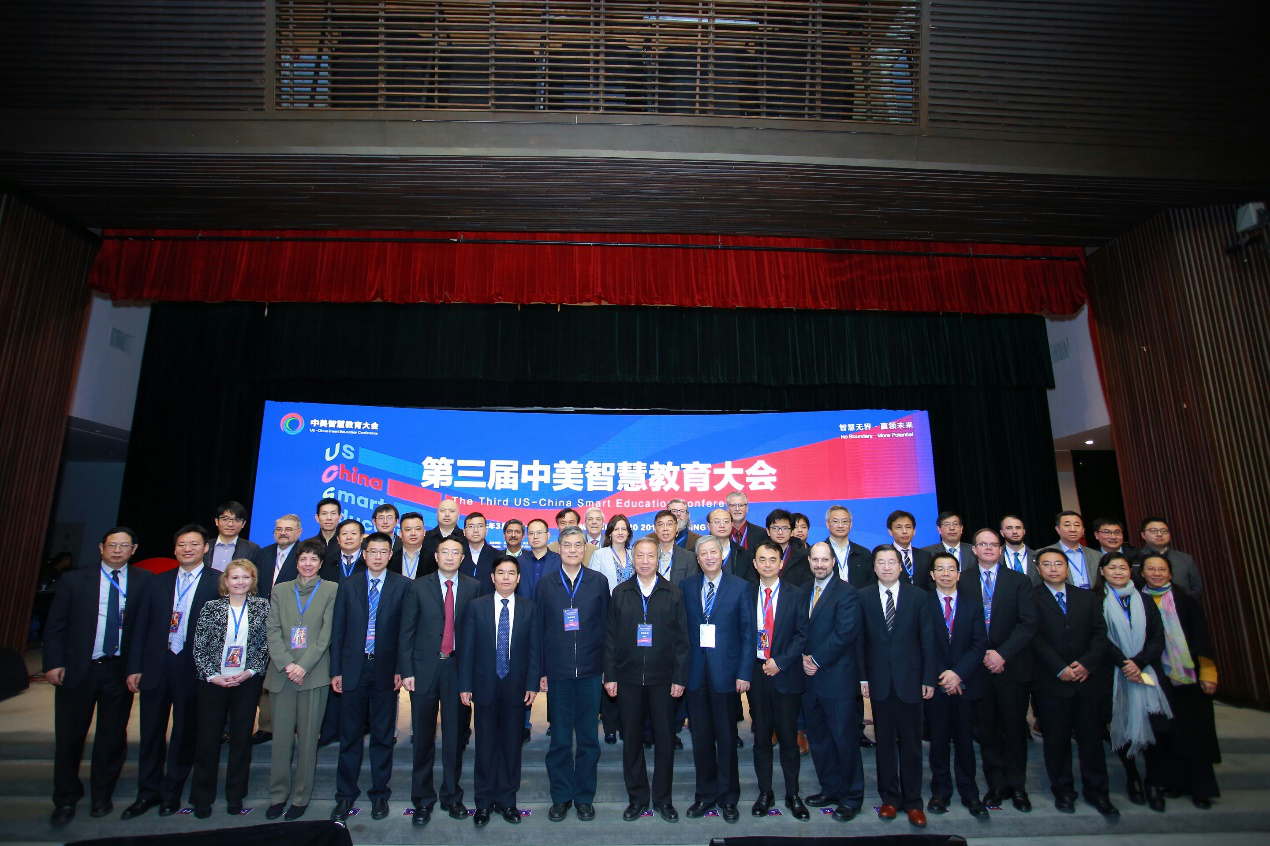
Group Photo at the Opening Ceremony
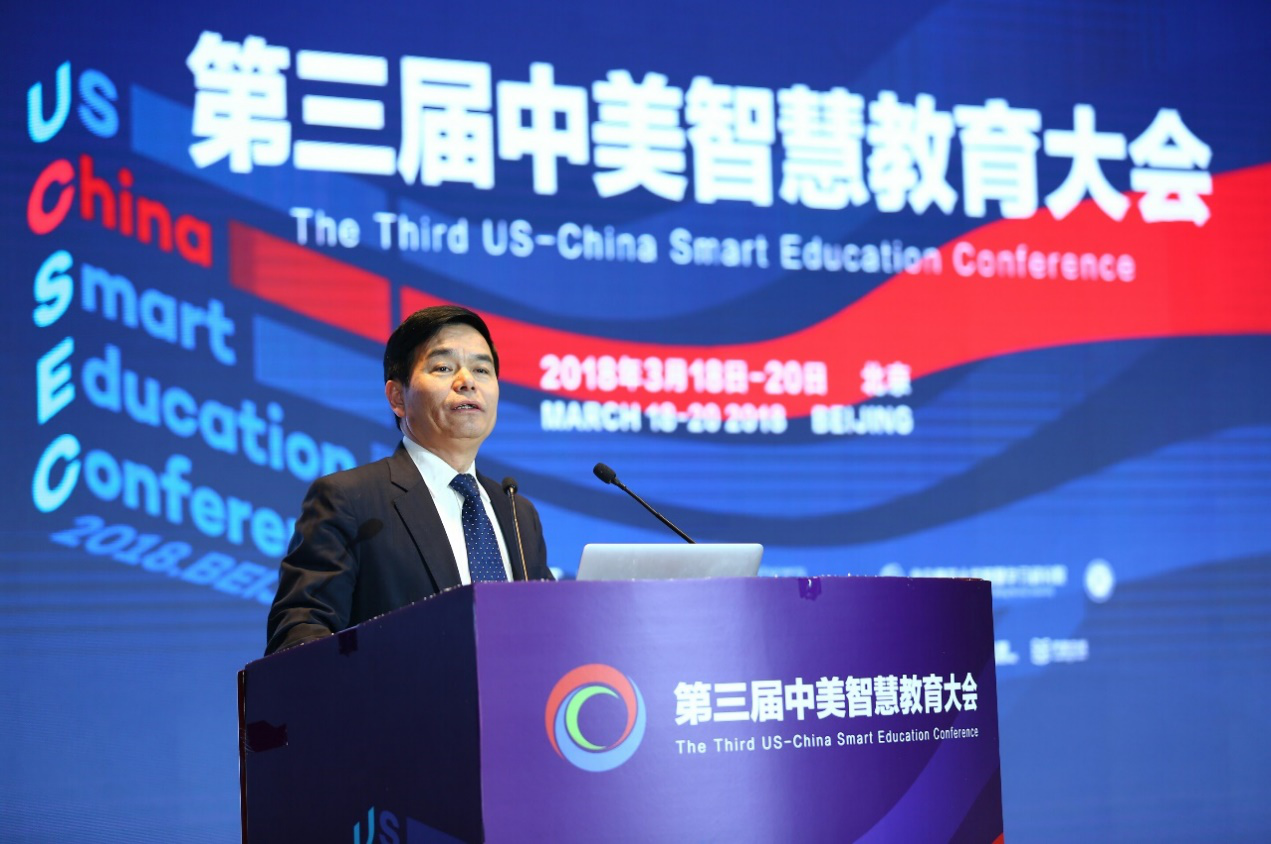 President Dong Qi of Beijing Normal University
President Dong Qi of Beijing Normal University
As President Dong Qi pointed out at the opening ceremony, smart education should be adopted to push for education equality, improve education quality, resolve practical educational issues, promote policy and institutional reform and expedite the research of brain science, so as to provide a solid foundation and strong momentum for the further development of smart education in the future.
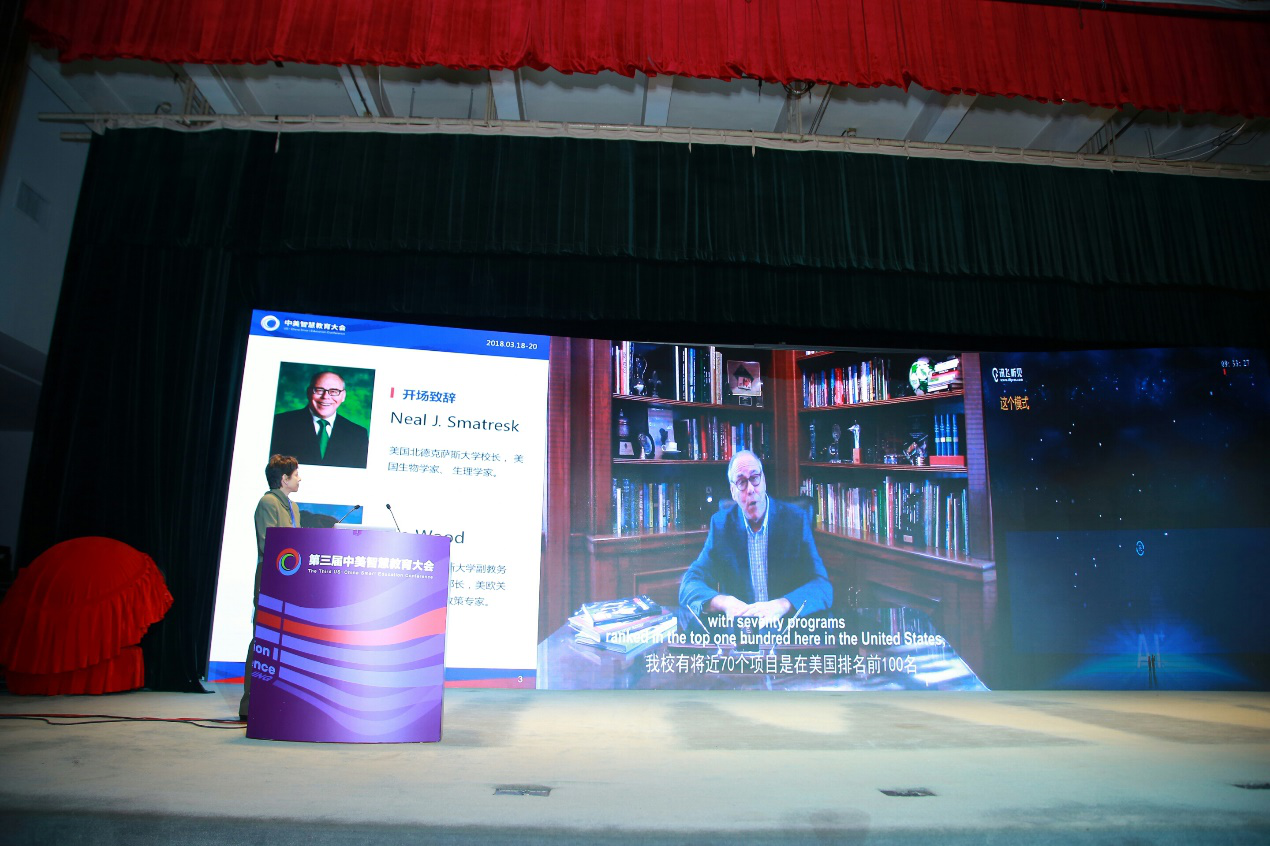
President Neal J. Smtresk, University of North Texas
President Neal J. Smatresk delivered a speech through video. He said that the US-China Smart Education Conference inspired us to significantly change the ways of learning on campus with technology. He hoped that all colleagues at the conference would jointly make creative and innovative changes to the world.
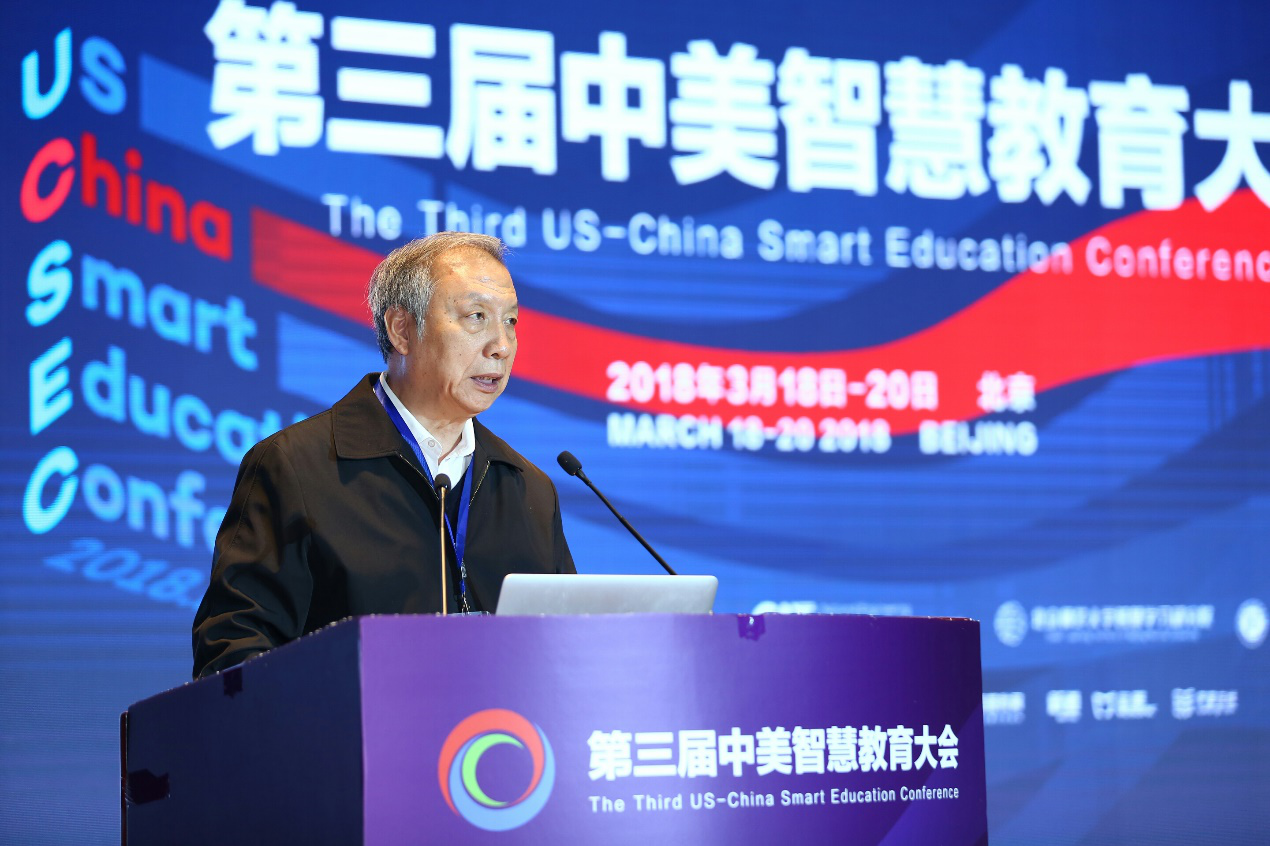
Mr. Zhao Qinping, Academician of the Chinese Academy of Engineering
Academician Zhao Qinping remarked that in the field of education, multi-media and computer teaching will be followed by virtual reality (VR) in reshaping people’s ways of learning. VR will serve as an important promotional force in all aspects of education and usher in a new chapter of education.

Vice President Zhou Zuoyu, Moderator of the Opening Ceremony
Academician Pan Yunhe delivered a keynote report entitled “AI 2.0 and Educational Development”. He pointed out that AI is entering a stage of 2.0, where key technologies such as big data intelligence, swarm intelligence, cross-media intelligence, augmented human-machine hybrid intelligence and autonomous intelligence system have already been applied in smart cities, smart healthcare, smart manufacturing and various other fields. AI 2.0 has posed multiple challenges to education. For example, smart support for personalized education based on big data intelligence, cross-media learning and lifelong learning. At the same time, Pan stated that ICT in Chinese education should undergo three stages which are respectively marked by digitalization, network and intelligence. In implementing the new-generation AI strategy, teambuilding and talent cultivation are extremely important. The application of AI in education should be coupled with multiple areas in tackling challenges so as to realize the upgrading of education.
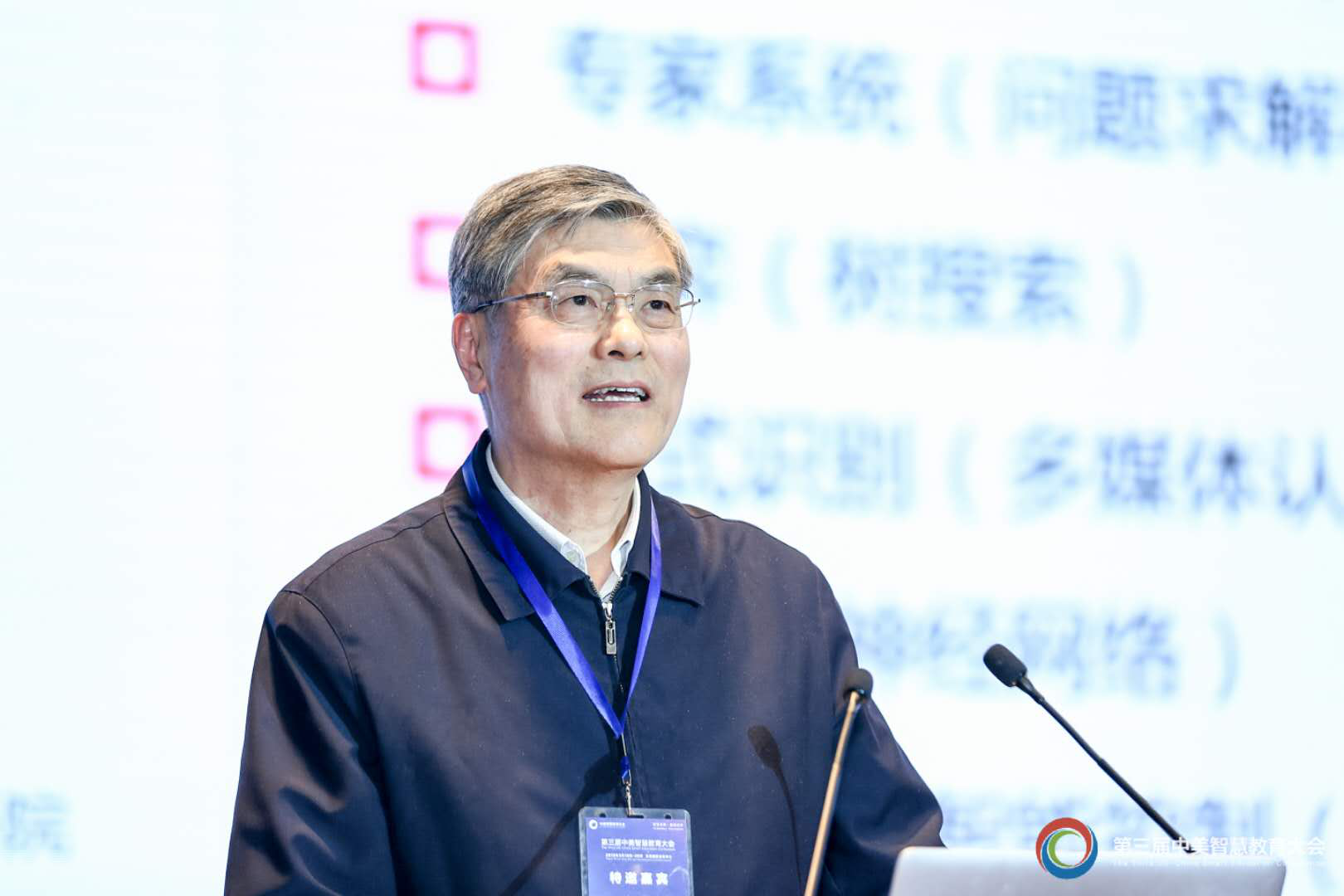
Mr. Pan Yunhe, Member of the Chinese Academy of Engineering
In his report entitled “Chinese Education in the New Era: from 1.0 to 2.0”, director Lei Chaozi said that according to the new requirements as specified in the 19th Party Congress, the strategic decision of launching the Action Plan of ICT in Education 2.0 was made. It constitutes an important step forward in this field and also an essential part of smart education. The plan has laid out several basic objectives. ICT shall facilitate the teaching of all teachers and the learning of all students; the building of digital campus should serve the schools as a whole; the application level should be improved along with the faculty and students’ information literacy; a major platform of “internet + education” shall be built so as to form new models of talent cultivation in the age of “internet+”; novel modes of education service based on the internet shall be developed while new modes of education governance in the information era shall be explored. Lei believed that there are three transformations to strive for. First, the transformation from the development, application and service of private education resources to that of big resources. Second, the shift of focus from improving the application capability of information technology to improving teachers and students’ information literacy. Third, the change from integrated ICT application in education to innovative development.

Director Lei Chaozi, Science and Technology Division, Ministry of Education
Mr. Zhong Binglin, Chairman of the Chinese Society of Education, delivered a keynote report entitled “Meeting the New Challenges of Web-Based Teaching”. According to Zhong, web-based teaching has led to new opportunities and challenges in the process of resolving major education issues in the new era. Internet education facilitates the expansion of sound educational resources and fuels the internationalization process of education. As technologies of the internet, digital knowledge and mobile communication are rapidly developing, people’s ways and channels of acquiring knowledge are profoundly changed while traditional learning process is disrupted. A new form of partnership is formed between the students and faculty together with transformed educational concepts, intuitional innovation, deepened teaching reform and improved quality of teachers. Looking ahead, further development of VR, augmented reality (AR) and AI technologies along with their integration with education, especially with the teaching process, will bring about new impact on school education. It is necessary to keep optimizing web-based teaching while avoiding detours, with a focus on bringing up the quality of online courses and stepping up integrated planning, so as to create sound educational resources that feature joint contribution and shared results.
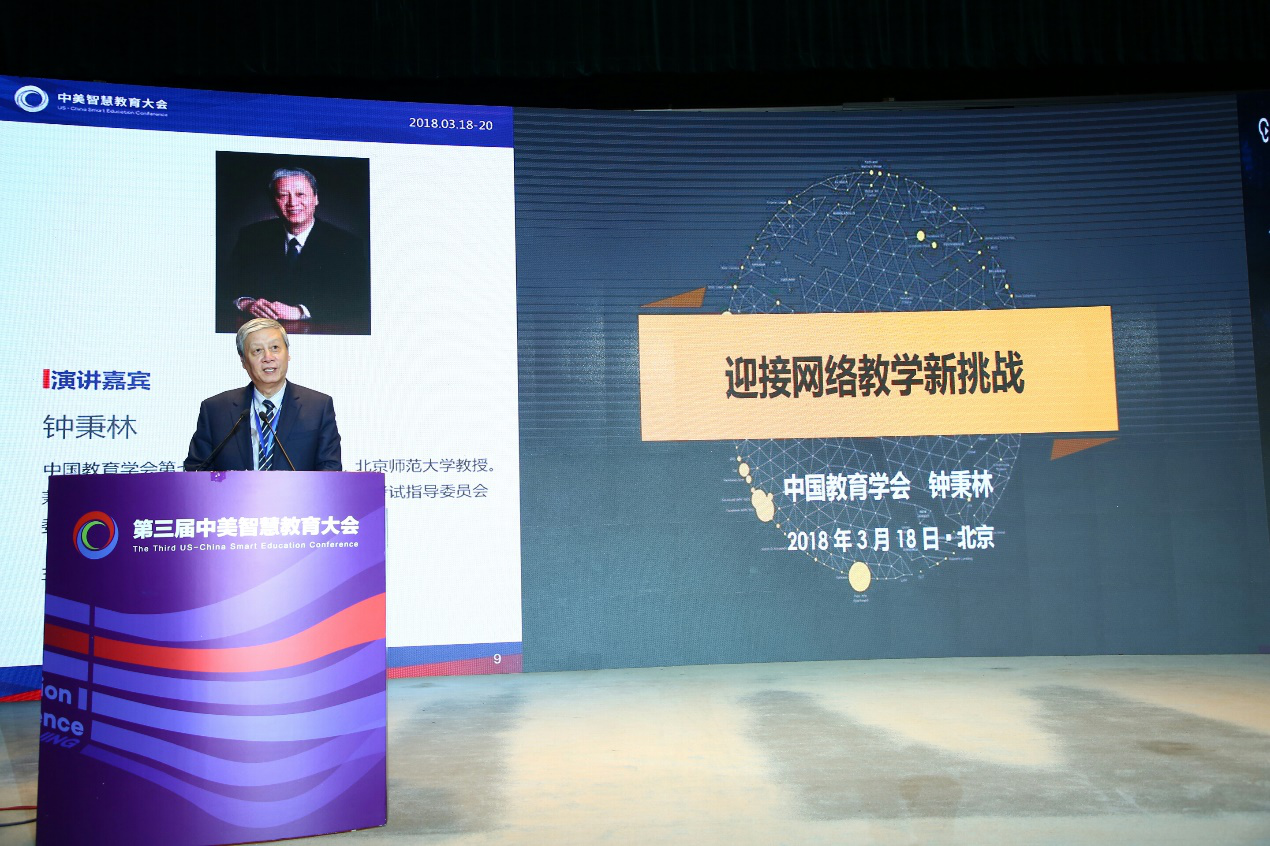
Chairman Zhong Binglin of the Chinese Society of Education
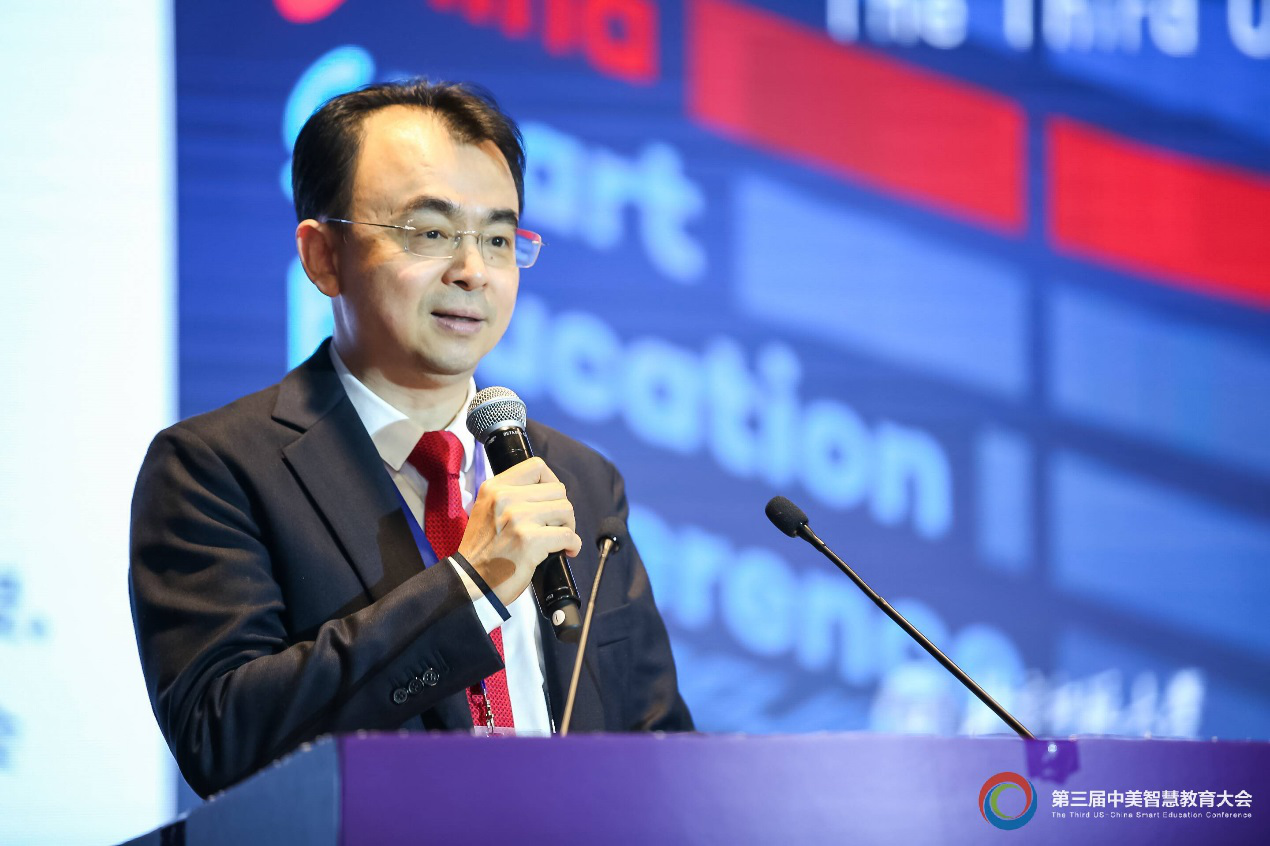 Prof. Liu Dejian, Moderator of Keynote Reports and Co-Dean of the Smart Learning Institute of Beijing Normal University
Prof. Liu Dejian, Moderator of Keynote Reports and Co-Dean of the Smart Learning Institute of Beijing Normal University
Upon the invitation of the conference, Mr. Wang Yangnan, head of the Research Institute of the Vocational and Technical Education Center under the Ministry of Education, Mr. Joseph South, former director of the Education Technology Office under the US Department of Education and Shan Zhiguang, director of the ICT Application and Industrial Development Office under the State Information Center, also delivered insightful reports.

Mr. Wang Yangnan, head of the Research Institute of the Vocational and Technical Education Center under the Ministry of Education
In his report entitled “Deepening the Industry-Education Integration for Vocational Education”, Mr. Wang Yangnan pointed out that China’s vocational education has entered a golden period, gradually charting a course of vocational education with Chinese characteristics featured by industry-education integration and school-business cooperation. The integration of education and industry should be the focus as we seek to reform education models and mechanisms with the fundamental mission of improving education quality in mind.
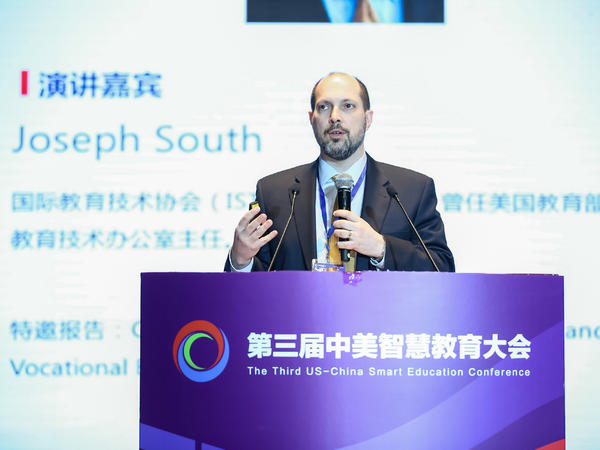
Mr. Joseph South, Former Director of the Office of Educational Technology, U.S. Department of Education
Mr. Joseph South reported on the topic of “OER in U.S. Primary, Secondary, and Vocational Education: New Frontiers”. He shared with the audience the current situation of the use of open educational resources in the US. The US government is working towards the even distribution of educational resources through organizing relevant activities and projects and building websites, pushing forward elementary and secondary education, especially vocational education.
Shan Zhiguang, Director of the ICT Application and Industrial Development Office under the State Information Center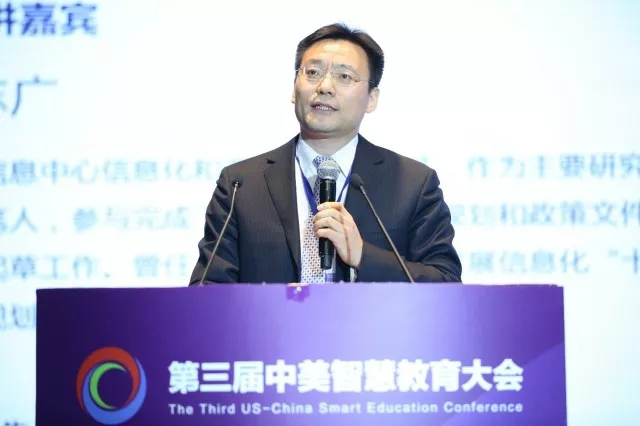

In his report entitled “Exercising the Wisdom of Education and Promoting Smart Education”, director Shan Zhiguang pointed to the current issues related to education. He proposed the idea of combining traditional Chinese wisdom of education with such new technologies as AI, big data and VR, so as to explore new modes of education, push for reform and innovation in the education system and promote smart education development.
Prof. Michael Spector, University of North Texas, US 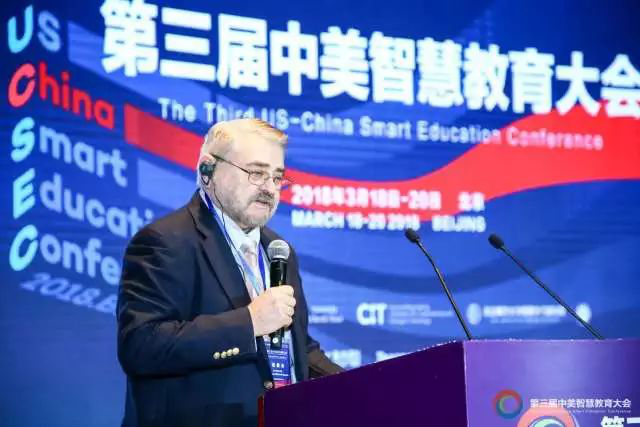

The conference also invited experts and scholars from the National Natural Science Foundation of China, the Natural Science Foundation (US), People-to-People Exchange Center under the Ministry of Education, the Chinese Association of Education Technology, the Association for Education Communications and Technology (US), the AECT and other organizations. They delivered remarkable reports regarding issues such as AI, smart education, industry-education integration and US-China educational exchanges and cooperation.
The conference had a number of forums on “education of innovation and entrepreneurship”, “enterprise strategic development in a smart era” and “industry-education integration and breakthroughs of new technological clusters”. During the events such as thematic sessions on “AI and education”, “smart campus” and “US-China cooperation in smart technology” to be held on March 19th to 20th, experts from the academic and business communities of the two countries will engage in fruitful discussions.
The 2018 Technology Outlook for Chinese Vocational Education: A Horizon Project Report will be released as the highlight of this year’s conference. This is the research result of nearly a hundred distinguished experts in vocational education and education technology, following the 2016 NMC Technology Outlook for Chinese K-12 Education and the 2017 NMC Technology Outlook Chinese Higher Education.
The conference had a number of forums on “education of innovation and entrepreneurship”, “enterprise strategic development in a smart era” and “industry-education integration and breakthroughs of new technological clusters”. During the events such as thematic sessions on “AI and education”, “smart campus” and “US-China cooperation in smart technology” to be held on March 19th to 20th, experts from the academic and business communities of the two countries will engage in fruitful discussions.
The 2018 Technology Outlook for Chinese Vocational Education: A Horizon Project Report will be released as the highlight of this year’s conference. This is the research result of nearly a hundred distinguished experts in vocational education and education technology, following the 2016 NMC Technology Outlook for Chinese K-12 Education and the 2017 NMC Technology Outlook Chinese Higher Education.
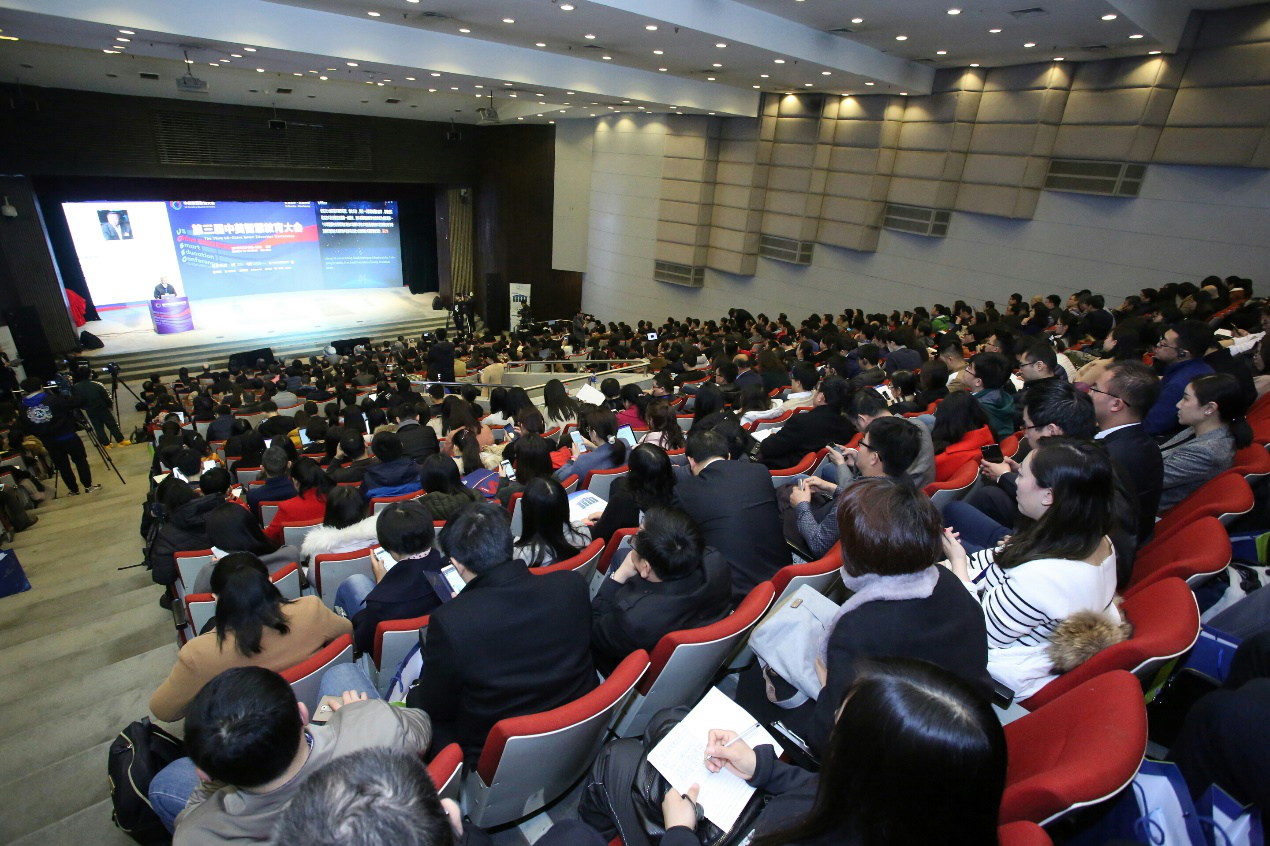
The US-China Smart Education Conference

